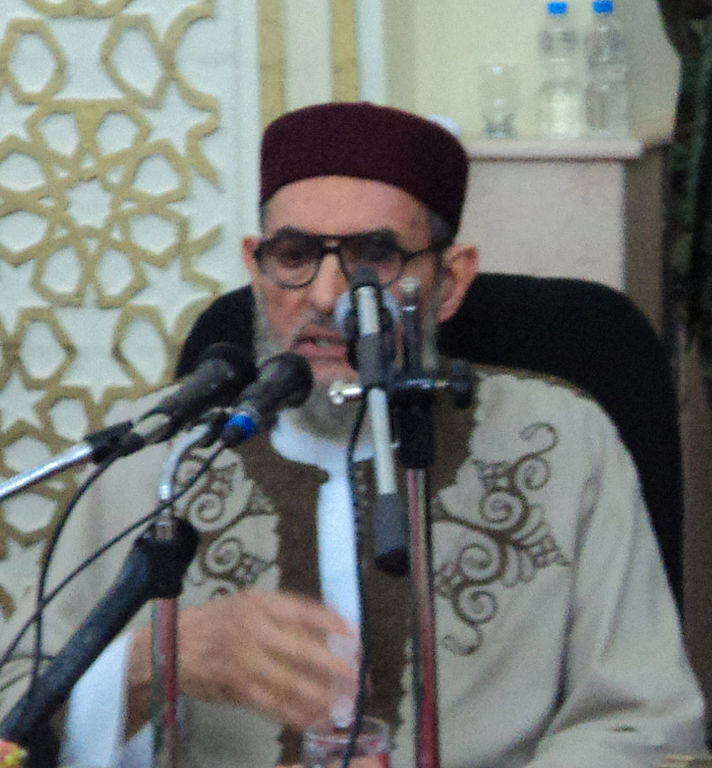Tripoli, 15 September:
In his strongest attack to date of . . .[restrict]the actions of extremists, Libya’s Grand Mufti, Sheikh Sadeq Al-Ghariani, has issued a fatwa condemning Tuesday’s killing of US Ambassador Chris Stevens along with three other American diplomatic staff and a number of Libya security guards. He said those involved were criminals who were damned by their action.
He also condemned the production of any film, picture or article insulting the Prophet Mohammad or any of the prophets by “extreme fanatics” in the US or elsewhere.
The Prophet Muhammad, Ghariani said, had specifically forbidden the killing of ambassadors and envoys.
He also pointed to a hadith in which the Prophet had said: “He who kills a confederate will not enter paradise.” (A “confederate” is seen as someone who come to a Muslim country and lives peacefully among Muslims.)
The fatwa criminalised anyone taking part in armed attacks without the consent of the legitimate authorities.
What had happened in Benghazi was, it stated, “an attempt to undermine state authority”. It said that all Libyans who cared about their country, anyone who was intelligent, indeed anyone who considered themselves as Muslims should “despise” what had happened.
“Such an act, in fact, is likely to cause severe harm to the higher interests of the country, could unite nations against us, would give others justification to classify us amongst states sponsoring terrorism”, the fatwa stated.
Accusing extremists of twisting and perverting the message of Islam, it added that the attack could “give Islam a bad name, inciting hatred towards us, putting off those who were contemplating Islam”. It could even create a backlash among Muslims.
Ghariani’s ruling also accused the authorities over the killings. The attack was a “clear indication of chaotic security”, it declared. What had happened was the inevitable result of nothing being done in recent months about several violent incidents carried out by armed militias “which used arms without the authority of the state”.
The Grand Mufti made a direct link between the Benghazi attack and earlier attacks on shrines and mosques across the country.
“They violated tombs and graves during which many lives were lost, such as the incidents of Rajma and Ajilat and before that incidents of Zliten, Misrata and Tripoli as well as many other places.”
He also said the Benghazi attack as a result of the failure of the state to impose its authority generally.
This had resulted in so many other Libyans being killed in other incidents. The violation of state authority had claimed “hundreds if not thousands of lives in Kufra, Sebha, Ghadames and in many other southern towns”, Ghariani said, pointing to the various clashes that had involved Tebus, Tuareg, the Zway, Wershafana and Mshasheya tribes, and the inhabitants of Zuara, Jmail, Zintan, Suq Al-Juma and Bani-Walid.
Families from Bani-Walid were displaced and “are still being chased after”, he said. “Let us not forget what has been happening in Benghazi: many military, security officials have been assassinated”. There had been car bombs there and in Tripoli.
Other cities were “still completely considered beyond the law and which do not approve of legitimacy of the state”, he added.
“We must not forget the abduction, robbery, confiscation of property, torture, in most cases to death, of innocent people or the disfigurement of them.”
There were victims everywhere “and yet neither the former NTC nor the government had the courage to come out and admit that what happening was because of its weakness and failure to impose law and order”, he said in a damning indictment. “Instead, we keep hearing the same story about ‘tribal disputes’.”
Legislation had been passed to enforce the law and bring the attackers to account, “but all these turned out to be hollow and were nothing but empty promises”, the fatwa stated. “None of the laws passed have been implemented.”
As a result, “this had encouraged all outlaws, whose desire was to seek wealth or power or to impose an ideology at gun point”. [/restrict]











